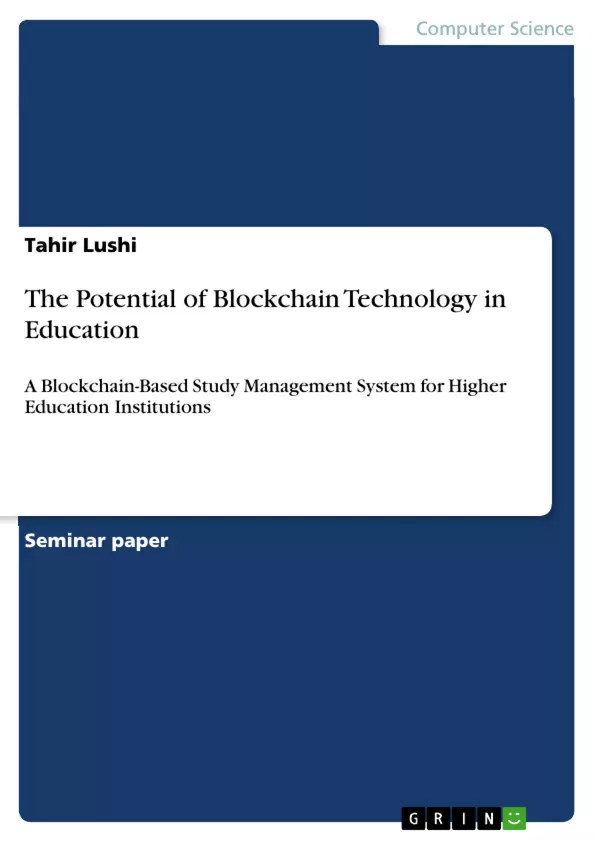This paper aims to show possibilities of the blockchain technology in the field of education. It seeks to theoretically conceptualize a platform, which could be used by universities, students, and employers to manage ECTS credits and degree certificates. This means a platform, through which the university would issue ECTS credits to students as tokens after successfully passing an exam and consequently a degree certificate after getting the needed number of credits/tokens. Students would be able to show their achievements to their potential employers or to another university through showing their public key.
A case study in this paper will be the EduCTX platform, which offers a relatively well thought solution to the above-mentioned problems. This platform will be described in detail and it will also get expanded with some new ideas to make it even more suitable for the stakeholders.
The paper starts with a very brief description of blockchain and its characteristics, to continue thereafter with the possible uses of blockchain in the education industry and especially higher education. Case studies will follow and will also be advanced and adopted to the situation. To conclude the paper there will be a combination of the described solutions in one hypothetical case of five universities that offer a joint degree.
Inhaltsverzeichnis (Table of Contents)
- Introduction
- A short description of the Blockchain Technology
- Possibilities of using Blockchain in education
- Management of student records (ECTS)
- Award of qualifications
- Sovereignty over personal identity (Self-Sovereign Identity)
- Possible complications of using blockchain in higher education
- Imagining a "Blockchain University"
- Conclusion
Zielsetzung und Themenschwerpunkte (Objectives and Key Themes)
This paper examines the potential applications of blockchain technology in the higher education sector, particularly focusing on its use in managing student records and awarding qualifications. The paper explores the benefits of using blockchain for digitizing and securing these processes, advocating for a more transparent and efficient system that can be accessed and verified by both students and institutions.
- Utilizing blockchain for secure and transparent management of student records, particularly ECTS credits
- Exploring the possibility of issuing and verifying qualifications through blockchain-based systems
- Assessing the potential of blockchain technology to enhance student self-sovereignty and data security
- Evaluating the challenges and limitations of implementing blockchain solutions within the higher education system
- Presenting the concept of a "Blockchain University," where blockchain technology plays a central role in managing all academic processes
Zusammenfassung der Kapitel (Chapter Summaries)
- Introduction: This section provides a general overview of the paper's topic, highlighting the potential of blockchain technology to address issues in higher education, specifically focusing on managing student records and issuing qualifications.
- A short description of the Blockchain Technology: This section introduces the fundamental principles of blockchain technology, outlining its key characteristics, including decentralization, security, and immutability.
- Possibilities of using Blockchain in education: This section explores the potential applications of blockchain in higher education, focusing on student record management (ECTS) and the award of qualifications. It examines the advantages of using blockchain in these areas and discusses the potential for a more secure and efficient system.
- Management of student records (ECTS): This section focuses on the specific application of blockchain for managing ECTS credits, analyzing the existing challenges and proposing solutions based on the EduCTX platform. It examines the potential for a more efficient and transparent system for awarding and transferring ECTS credits.
Schlüsselwörter (Keywords)
This paper explores the use of blockchain technology in higher education, focusing on areas such as student record management, particularly ECTS credits, and the issuing of qualifications. It examines the benefits of blockchain's decentralized, secure, and transparent nature for improving the efficiency and reliability of these processes. The paper also considers the potential impact on student self-sovereignty and data security and presents the concept of a "Blockchain University" as a future model for educational institutions.
- Arbeit zitieren
- Tahir Lushi (Autor:in), 2018, The Potential of Blockchain Technology in Education, München, GRIN Verlag, https://www.hausarbeiten.de/document/538896


